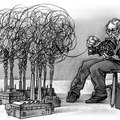Marauding maharajahs
Mar 29th 2007 | DELHI
From The Economist print edition
The more Indian firms make acquisitions, the more acquisitions they want to make

FOR proud Indians, nothing—except perhaps victory for their national cricket team—is as sweet as the sight of Indian companies marauding acquisitively across the globe. And marauding they are. So far this year Indian firms have announced 34 foreign takeovers worth more than $10.7 billion in all, according to Dealogic, a market-research outfit. Last year's total was $23 billion, more than five times the previous record and more than the investments made by foreigners in Indian companies. For local industrialists, among the proudest Indians, the buying binge indicates a renaissance, and not only in business. “There's a new India emerging,” says Kumar Mangalam Birla, chairman of the Aditya Birla Group, a big conglomerate. “This shows the new-found respect that India commands in the global arena.”
He should know. Last month Hindalco, the group's aluminium company, bought Novelis, an American rival, for $6 billion, making it the world's biggest aluminium-rolling company. This was barely a week after Tata Steel, India's biggest private steelmaker, sealed an even bigger deal that it had embarked upon last October. It agreed to buy Corus, an Anglo-Dutch rival, for $13.2 billion, a sum nine times the size of the previous largest foreign acquisition by an Indian firm.
Both deals partly reflect the conditions that are encouraging many smaller Indian businesses to buy globally, in pharmaceuticals, computing, car parts, energy and so on. With GDP growth averaging 8% and efficiencies wrought in leaner times, Indian firms have been minting money in the past three years. Their average profit margins are around 10%—more than twice the global average. By one estimate, 60% of India's 200 leading companies are looking to invest this loot in foreign purchases.
Financing such deals is easier than ever. After reforms to capital markets, the stockmarket has exploded even as interest rates have remained low. Other bottlenecks have been removed, including rules limiting the debt that companies can accrue. Last year Ranbaxy, a pharmaceuticals company, used a $440m bond issue to help fund eight acquisitions, in America, Romania, Italy, South Africa and elsewhere. Equally important is the bristling confidence that these advances have imbued in Indian companies. Mr Birla says it would have been very hard to imagine buying Novelis five years ago.
The total value of Indian purchases abroad accounted for 1.8% of that of all cross-border deals last year. But they are growing, with the size of the average Indian foreign acquisition rising tenfold, to $315m, in recent years. Indian business looks certain to continue globalising, partly by buying foreign companies. The removal of remaining barriers to foreign direct investment in India will also bring global benefits, of technology and scale, back home. On March 22nd, after much delay, the government approved a proposal to raise the limit on foreign ownership of telecoms firms to 74%.
Indian companies began their spree in around 2000, which saw 50 foreign deals, together worth less than $1 billion. Most of the deals were, as they still are, done by pharmaceutical and computer-services companies. These were notable survivors of a traumatic liberalisation in the 1990s. They emerged sleeker, more competitive and lusting for new markets for their exports. For such firms, foreign acquisitions are a way to connect their cheap and skilled workforce to new markets and established clients. “For us, India is only one market in the world, though an important one,” says Malvinder Singh, the boss of Ranbaxy, which generates 80% of its business abroad. (That said, Ranbaxy has been more cautious of late. On March 20th it pulled out of the bidding for a subsidiary of Merck, a German drugs giant, which would have made it the world's seventh-biggest maker of generic drugs.)
Another acquisitive urge is for technology, for example in manufacturing. That is one reason behind Hindalco's purchase of Novelis, which makes aluminium cans, a high-value product. To develop a similar facility in India would have taken Hindalco around five years, which it did not have. “In the next three years we'll be long on aluminium,” said Mr Birla. “And this aluminium needs to go somewhere to get value added.” Technology is a big concern for Suzlon Energy, the world's fifth-biggest maker of wind turbines. Last year it paid $565m for Hansen, a Belgian gearbox-maker. “Suzlon understands wind technology and Hansen understands only gearboxes. Now both R&D teams are sitting together, designing products,” says Suzlon's chairman, Tulsi Tanti. Last month Suzlon made a $1.3 billion bid—the third-biggest by an Indian firm—for REpower, a German turbine-maker.

Such deals are typical for companies from emerging economies. Tata Steel's acquisition of Corus was different. The company survived liberalisation, and then prospered, by investing in sophisticated capital-intensive production. As the world's lowest-cost steel producer, it was able to raise the money to buy Corus, its bigger rival, and become the world's fifth-largest steelmaker. It now aims to dominate its market. Only a handful of Indian firms are capable of such vast ambition. And most, being family-owned, may be too reticent to accept the associated risks.
Nonetheless, the tide of foreign acquisitions by Indian companies will continue to rise, with more and bigger deals. How successful they will be is less certain. No big foreign acquisition has failed so far—even though, according to consultants at McKinsey, that is the fate of 60-70% of cross-border takeovers. “It's important for companies to look at the economic rationale, and not get taken to extremes by emotion and ego,” says Ranbaxy's Mr Singh. Wise words for proud Indians, especially since their cricket team keeps losing.




